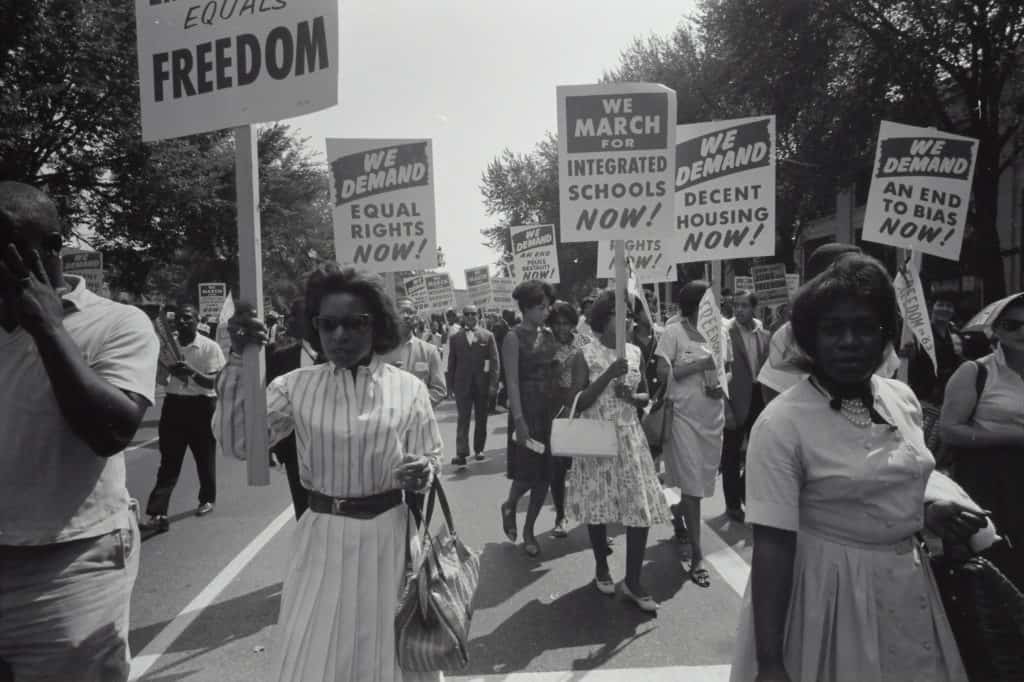The Affirmatively Furthering Fair Housing (AFFH) Rule was created in 2015 as a promising new rule under the Fair Housing Act (FHA) to increase local accountability with affordable housing funds. However, earlier this year, the U.S. Department of Housing and Urban Development (HUD) proposed a new AFFH rule that would reverse years of progress by no longer enforcing meaningful community participation in the fair housing planning process. It would skirt substantive goals in the previous rule that addressed segregation, poverty and discrimination, and it would eliminate accountability for local cities, counties and states in their obligations to AFFH.
Most Americans were not taught in school that it was legalized racism that ensured people of color could not buy homes in quality neighborhoods in the United States. Most Americans are unaware that federal, state and local laws intentionally prevented people of color from buying homes – homes that were made readily available and affordable for White people.
As suburbs were built in the 1940’s, discrimination and racism in housing was legal. Only White families were legally allowed to purchase these new suburban homes with lucrative mortgages that nearly always resulted in instant equity. White homeowners enjoyed new, beautiful neighborhoods, good schools, solid infrastructure, thriving businesses and the ability to build generational wealth through the gains made from purchasing a home. Black families were purposely cordoned off from these suburbs and restricted to neighborhoods with inadequate infrastructure, undersupported schools, struggling businesses and a lack of access to living wages, fresh food, clean water and banking services. Subsequently, people of color could not build the generational wealth that millions of White Americans now enjoy from their grandparents’ accessibility to homeownership in well-financed neighborhoods.
The murder of Martin Luther King, Jr., in April 1968, coupled with frustrations from poverty and injustice, resulted in protests and fires breaking out in poor neighborhoods and cities across the country. FHA passed seven days later, and housing discrimination based on race, color, national origin, religion and gender became illegal. Later, familial status and disability were added for a total of seven protected classes. FHA was purposefully race-conscious. It recognized that intentional, legal segregation deeply harmed communities of color and required all federal agencies, their contractors and grantees “affirmatively further fair housing” to rectify the harm imposed upon people of color and other protected classes.
Combatting the harmful effects of discrimination and segregation is at the heart of the AFFH obligation within the Fair Housing Act. The 2015 AFFH rule furthered this mission directly by requiring participating programs to submit an assessment of fair housing (AFH) that explicitly addressed AFFH for the seven protected classes under FHA. The idea was to not only stop discrimination and harm to those in segregated, poor communities but to actively and affirmatively invest in people of color and their homes.
However, the new rule proposal would remove the requirement for programs to submit an AFH even though HUD does not currently require programs to address discrimination against protected classes in other required housing and community development plans.
The AFH was the main mechanism communities had to ensure the local allocations of federal funding from HUD, like Community Development Block Grant (CDBG) dollars, actually go to the people and places that are harmed by discrimination and injustice. Until the AFFH Rule was promulgated in 2015,, most communities did not have a meaningful fair housing planning process. Often, the HUD funding and CDBG dollars intended for poor, segregated communities were instead used to make thriving White communities even better without many consequences. The new rule proposal would return to such a state by removing the obligation of programs to give the public broad opportunities to involve themselves in the development of an AFH and consult with constituent organizations that represent members of protected classes.
A criticism from HUD is that the 2015 AFFH Rule adds “unworkable requirements” for community groups that they are unable to fulfill. On the contrary, it imposed no specifications on the form and number of goals or the measurements to be used in assessing progress. Additionally, HUD approval did not punish local jurisdictions for submitting inadequate and incomplete AFHs. Rather, the rule was centered around a review and approval process that allowed applications to receive feedback, undergo revisions and be resubmitted with stronger, more comprehensive assessment procedures. The 2015 AFFH is structured as a critical planning tool to help local governments understand and find solutions for inequities in their communities by providing them with the flexibility to create goals and assessment measurements based on variations in local conditions. In fact, the proposed rule does the opposite of this; it creates a standardized list of “obstacles” that can be used in AFFH, a majority of which only address housing affordability and supply but not discrimination against protected classes. This is an inaccurate and inadequate prescription to address racial segregation. The proposed rule would also replace fair housing requirements with “housing choice” requirements. This means that fair housing quotas can be met simply by eliminating regulations such as permitting requirements, design standards and building codes meant to protect homeowners and vulnerable populations. Unfortunately, simply increasing the incentives to supply affordable housing does not guarantee that local and regional housing patterns will desegregate.
The Fair Housing Act’s AFFH obligation is one of only a handful of tools that we have to rectify the horrors and massive injustices of past legalized housing discrimination. Ensuring the AFFH rule creates access to opportunity for those that have been harmed by decades of legalized discrimination and exploitation is the goal of NCRC, our members and partners. Please sign on to our letter opposing the Trump Administration’s rulemaking or make a comment at regulations.gov.
Kristina Musante was NCRC’s director of the National Training Academy.
Maxim Applegate is a communications and development intern at NCRC.
Photo by Library of Congress on Unsplash



